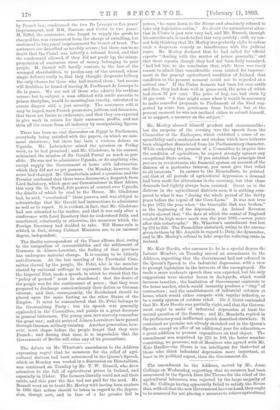Mr. Morley showed himself prudent and statesmanlike; but the surprise
of the evening was the speech from the Chancellor of the Exchequer, which exhibited a sense of re- sponsibility and a moderation and wisdom which have hitherto been altogether dissociated from his Parliamentary character. While endorsing the promise of a Committee to inquire into the condition of agriculture, he argued strongly against any exceptional State action. "If you establish the principle that you are to revolutionise the financial system on account of the distress of a particular interest, you must give that relief to all interests." In answer to the Bimetallists, he pointed out that at all periods of agricultural depression a demand had been made for alterations in the currency, but that these demands had rightly always been resisted. Great as is the distress in the agricultural districts now, it is nothing com- pared to what it was "during the whole period of the thirty years before the repeal of the Corn-Laws." It was not true to put 1873, the year when "the bimetallic link was broken," as the beginning of the depression. An Inland Revenue return showed that "the date at which the rental of England reached its high-water mark was the year 1880,—seven years. after this catastrophe." Mr. Wharton's amendment was lost by 272 to 232. The Parnellites abstained, owing to the answer given to them by Mr. Asquith in regard to Daly, the dynamiter, and to Mr. Morley's refusal to take steps for reducing rents in Ireland.


































 Previous page
Previous page